

Your corporate internet nightmare starts now. Jump To up down Close.
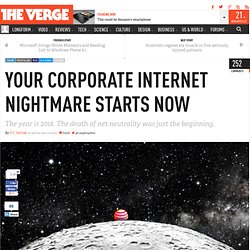
Facebook news feed: The algorithms, A/B tests, and surveying that make the social network so addictive. Illustration by Rob Donnelly.
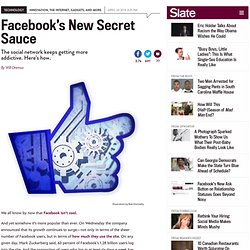
We all know by now that Facebook isn’t cool. And yet somehow it's more popular than ever. Goodbye, Net Neutrality; Hello, Net Discrimination. In 2007, at a public forum at Coe College, in Iowa, Presidential candidate Barack Obama was asked about net neutrality.
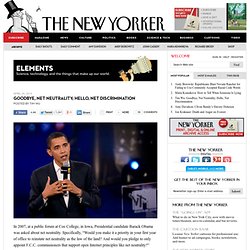
Specifically, “Would you make it a priority in your first year of office to reinstate net neutrality as the law of the land? And would you pledge to only appoint F.C.C. commissioners that support open Internet principles like net neutrality?” “The answer is yes,” Obama replied. Who Really Owns The Internet? Who Really Owns The Internet?
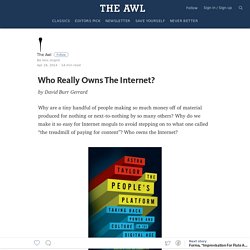
By David Burr Gerrard. Smartphones, the Disappointing Miracle. Ed Jones/Agence France-Presse — Getty ImagesFrom the various types of phones on the market to different carriers operating globally to competing operating systems, there are over 100 million possible permutations of how a signal might be processed to, say, load an app.

Smartphone users are frustrated and deprived by bad service, including slow application load times and frequent service crashes. Looking at it another way, we are like petulant children, whining about the insufficient miracle of technology while we pace in front of a microwave for our frozen burritos to cook. As they say, why can’t both things be true? A report issued Thursday by Crittercism, a privately held company that claims to monitor performance on thousands of mobile applications inside one billion phones, tells both parts of the tale.
For this study, Crittercism looked at three billion interactions a day with apps for one month. Do you miss the Microsoft/Intel duopoly in personal computers yet? How the NSA Almost Killed the Internet. On June 6, 2013, Washington Post reporters called the communications departments of Apple, Facebook, Google, Yahoo, and other Internet companies.

The day before, a report in the British newspaper The Guardian had shocked Americans with evidence that the telecommunications giant Verizon had voluntarily handed a database of every call made on its network to the National Security Agency. The piece was by reporter Glenn Greenwald, and the information came from Edward Snowden, a 29-year-old IT consultant who had left the US with hundreds of thousands of documents detailing the NSA’s secret procedures. Greenwald was the first but not the only journalist that Snowden reached out to. The Post’s Barton Gellman had also connected with him. NSA tracking cellphone locations worldwide, Snowden documents show. (Video: How the NSA uses cellphone tracking to find and ‘develop’ targets) The NSA does not target Americans’ location data by design, but the agency acquires a substantial amount of information on the whereabouts of domestic cellphones “incidentally,” a legal term that connotes a foreseeable but not deliberate result.
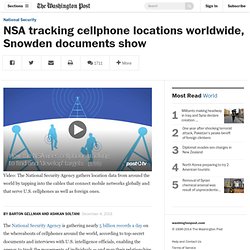
One senior collection manager, speaking on the condition of anonymity but with permission from the NSA, said “we are getting vast volumes” of location data from around the world by tapping into the cables that connect mobile networks globally and that serve U.S. cellphones as well as foreign ones. Additionally, data are often collected from the tens of millions of Americans who travel abroad with their cellphones every year. In scale, scope and potential impact on privacy, the efforts to collect and analyze location data may be unsurpassed among the NSA surveillance programs that have been disclosed since June.
The Dark Enlightenment: The Creepy Internet Movement You'd Better Take Seriously. Blossoming on the Internet like a fetid rose, a mysterious new political movement has generated a serious and not un-terrifying critique of modern society.

Its members are loud and growing in number, and they demand nothing less than the elimination of the democratic system. Mostly white, male and angry, they lie in wait for the imminent collapse of civilization. Ladies and gentlemen, welcome to the Dark Enlightenment. The Empire is striking back. Poll Reveals Americans Don't Trust Each Other Anymore. WASHINGTON (AP) — You can take our word for it.

Americans don't trust each other anymore. We're not talking about the loss of faith in big institutions such as the government, the church or Wall Street, which fluctuates with events. For four decades, a gut-level ingredient of democracy — trust in the other fellow — has been quietly draining away. The NSA's org chart. Geeks for Monarchy: The Rise of the Neoreactionaries. In Silicon Valley, Partying Like It’s 1999 Once More. The Questions Google Refuses To Answer About Search Privacy. Last month, Google made one of the biggest changes in search privacy ever, by routing all searches through its Google Secure Search service.

Why did it make the change? Why didn’t it close some loopholes that leave some search data vulnerable? Facebook Removing Option To Be Unsearchable By Name, Highlighting Lack Of Universal Privacy Controls. “Who can look up your Timeline by name?” Anyone you haven’t blocked. Facebook is removing this privacy setting, notifying those who had hidden themselves that they’ll be searchable. It deleted the option from those who hadn’t used it in December, and is starting to push everyone to use privacy controls on each type of content they share.
But there’s no one-click opt out of Facebook search. To be fair, the “Who can look up your Timeline by name?” We're All Technology's Guinea Pigs Now, Whether We Like It or Not. Becoming a guinea pig is the unspoken consequence of living in this, the second Industrial Revolution. Whereas the human guinea pigs in the first Industrial Revolution were indiscriminately subjected to new chemical compounds and air pollutants from recently built factories, we are immersed in new light wavelengths, electromagnetic clouds, radiation, and pathogens. Those previous guinea pigs were calmed by cheery slogans like "Better Living Through Chemistry" while we are pacified by the existence of alphabet-soup agencies like the FCC, FDA and USDA. But while regulators are certainly more reassuring than empty corporate slogans, it doesn't change the fact that the long-term impacts of new technologies can only be determined over time.
And that means whole populations become test subjects—whether they choose to participate or not. Edward Snowden reçoit un prix pour son «intégrité dans le renseignement» WASHINGTON - L'ancien consultant du renseignement américain, Edward Snowden, a reçu jeudi un prix remis annuellement par une association américaine composée notamment d'anciens membres de la CIA pour "son intégrité dans le travail de renseignement". "The Government Accountability Project", une organisation fondée par des anciens de l'agence américaine de sécurité nationale (NSA), de la CIA, du FBI ou encore du ministère de la Justice américain, a remis ce prix à Moscou où Edward Snowden, recherché par les Etats-Unis pour ses révélations sur la surveillance électronique américaine, vit en exil.
L'association a expliqué sur son site que cette récompense "était annuellement décernée par des officiers à la retraite de la CIA à des membres de la communauté du renseignement pour leur intégrité dans leur travail". Aucun détail n'était donné sur les circonstances de la remise de ce prix. Cette récompense a été remise le jour de l'arrivée du père d'Edward Snowden à Moscou. Let’s Build a More Secure Internet. NSA Can Reportedly Hack Your Smartphone. The National Security Agency can reportedly spy directly on smartphones, according to leaked documents from Germany’s Der Spiegel. 'THE JUNGLE': Largest Homeless Camp In US.
Toshiba has invented a quantum cryptography network that even the NSA can’t hack - Quartz. Time to make the photons. Toshiba If you’ve got communications that absolutely cannot be intercepted—whether you’re a NSA whistleblower, the president of Mexico, or Coca-Cola—quantum cryptography is the way to go. It harnesses the bizarro-world properties of quantum physics to ensure that information sent from point A to point B isn’t intercepted. The laws of physics dictate that nobody—not even the NSA—can measure a quantum system without disrupting it.
The problem, as Edward Snowden could probably tell you, is that quantum cryptography is still in its infancy. The US government has betrayed the internet. We need to take it back. Slavery! Anatomy of a hack: How the SEA took down the NYT and Twitter. How the NSA spied on Americans before the Internet. An illustration that appeared with a Washington Post article about warrantless NSA surveillance ... in 1977. NSA files: why the Guardian in London destroyed hard drives of leaked files. Guardian editors on Tuesday revealed why and how the newspaper destroyed computer hard drives containing copies of some of the secret files leaked by Edward Snowden. After Multiple Denials, CIA Admits to Snooping on Noam Chomsky. For years, the Central Intelligence Agency denied it had a secret file on MIT professor and famed dissident Noam Chomsky. The sneaky switch that set the stage for the NSA’s call records program.
Defenders of the National Security Agency’s controversial call records program, which vacuums up Americans’ phone logs in bulk, like to remind us that the Patriot Act power to collect “business records” has been ratified by large majorities in Congress. Yet a compromise sharply limiting that authority, strongly endorsed by then-Senator Barack Obama, was unanimously approved by the Senate way back in 2005—until a sneaky last-minute change turned the limits on their head.
Passed in haste mere weeks after the terrorist attacks of September 11, several provisions of the Patriot Act—including Section 215, which allows the government to obtain business records with an order from a secret court—included built-in expiration dates. Exclusive: U.S. directs agents to cover up program used to investigate Americans. The Business Of Fear. Another Top-Secret NSA Program Exposed and Other News You Need to Know. The Government Lied About Being Able To Read Your Email Without A Warrant. XKeyscore: NSA tool collects 'nearly everything a user does on the internet' Play With An MIT Tool That Visualizes How The NSA Can Map Your Relationships. Why Do We Endlessly Retweet Tragedy? In Secret, Court Vastly Broadens Powers of N.S.A. Wired 8.04: Why the future doesn't need us. NSA Snooping Was Only the Beginning. Meet the Spy Chief Leading Us Into Cyberwar. Don’t Panic, But We’ve Passed Peak Apple. And Google. And Facebook.
Exclusive: Former WikiLeaks Employee James Ball Describes Working With Julian Assange. The Decline of Eye Contact. Here's the Document that Started Apple's Hidden Irish Tax Scheme. Commentaires sur Internet : Quand les insultes tuent le message Why There’s No Mass Protest Over Government Surveillance. The One Thing Google Glass Forgot: Other People. Taking Innovation Seriously: Antitrust Enforcement If Innovation Mattered Most by Tim Wu. The Best Platform For Online Discussion Doesn’t Exist Yet. Facebook Graph Search Is Humorless, Creepy And Doomed To Disappoint. The Dunbar Number, From the Guru of Social Networks. Reddit Co-Founder’s Documentary, “Silicon Prairie” Reviewed.
In Your Face(book) — Here’s the Party You Weren’t Invited To. The Web We Lost. A Few Actual Harms To Be Concerned About From Today’s Government Spying Law. Facebook’s High-Stakes Poker Game. Why Facebook Makes Me Feel Like A Loser by Terence Eden has a Blog. Cassetteboy - The Web for Beginners.
No Agenda News Network. Tweets of rage: does free speech on the internet actually exist? Fuck Glory – Startups are One Long Con « Unicornfree. Startup Stagnation.